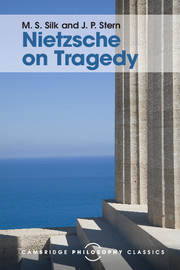Book contents
- Frontmatter
- Dedication
- Epigraph
- Contents
- Preface to this edition
- Preface
- Note
- 1 Germany and Greece
- 2 Biographical background I: Nietzsche and his early interests
- 3 Biographical background II: the genesis of The Birth of Tragedy
- 4 The argument of The Birth of Tragedy
- 5 The aftermath
- 6 Nietzsche's account of Greece
- 7 Mode and originality
- 8 Tragedy, music and aesthetics
- 9 Nietzsche and earlier German theories of tragedy
- 10 Style and philosophy
- Bibliography
- Index
7 - Mode and originality
Published online by Cambridge University Press: 05 August 2016
- Frontmatter
- Dedication
- Epigraph
- Contents
- Preface to this edition
- Preface
- Note
- 1 Germany and Greece
- 2 Biographical background I: Nietzsche and his early interests
- 3 Biographical background II: the genesis of The Birth of Tragedy
- 4 The argument of The Birth of Tragedy
- 5 The aftermath
- 6 Nietzsche's account of Greece
- 7 Mode and originality
- 8 Tragedy, music and aesthetics
- 9 Nietzsche and earlier German theories of tragedy
- 10 Style and philosophy
- Bibliography
- Index
Summary
The mixed mode of The Birth of Tragedy
‘Scholarship, art and philosophy’, Nietzsche had written in 1871, ‘are now growing together inside me so much that I'll be giving birth to centaurs one day.’ It is not some incidental flaw or quirk but the essential condition of BT that it is, as Nietzsche had predicted, a hybrid: a work of mixed mode between literature and ‘science’, between art and thought. It was this hybridity that prompted Rohde to call it a ‘didactic poem’ (Lehrgedicht) and Cosima Wagner to explain that she felt obliged to ‘read it as a poem’, even though it dealt with ‘the most profound problems’ – and finally Nietzsche himself to disown the book in his Self-Criticism of 1886 as neither one thing nor the other: ‘What spoke here…was something like a mystical, almost maenadic soul…that stammered with difficulty…as if in a strange tongue…It should have sung, not spoken, this new soul. What I had to say then – what a pity that I did not dare to say it as a poet: perhaps I had the ability. Or at least as a philologist: even today practically everything in this field remains to be unearthed and discovered by philologists!’ Here as elsewhere, however, Nietzsche's afterthoughts are not to be taken as definitive. We must define the hybridity more closely.
Although Nietzsche does not write as a philologist, he remains unmistakably a Hellenist. Despite his intense admiration for Schopenhauer and Wagner, and notwithstanding his own testimony to the stature or representative importance of the ‘entire Aryan community’ (§9), of Buddhism (§§18, 21), of Shakespeare (§2), of Rome (§21), he assumes that, within man's entire cultural experience, Greece (in its creative rise or its Socratic fall) comes first, ‘that the Greeks, as charioteers, hold in their hands the reins of our own and every other culture’ (§15). This unargued assumption – for assertion, however majestic, does not constitute an argument – Nietzsche shares with a hundred years of German Hellenism before him. From the time of Winckelmann, however, the quest for Greece is generally pursued in the spirit of historical method. Nietzsche's tendency is in a different direction.
- Type
- Chapter
- Information
- Nietzsche on Tragedy , pp. 226 - 272Publisher: Cambridge University PressPrint publication year: 2016

